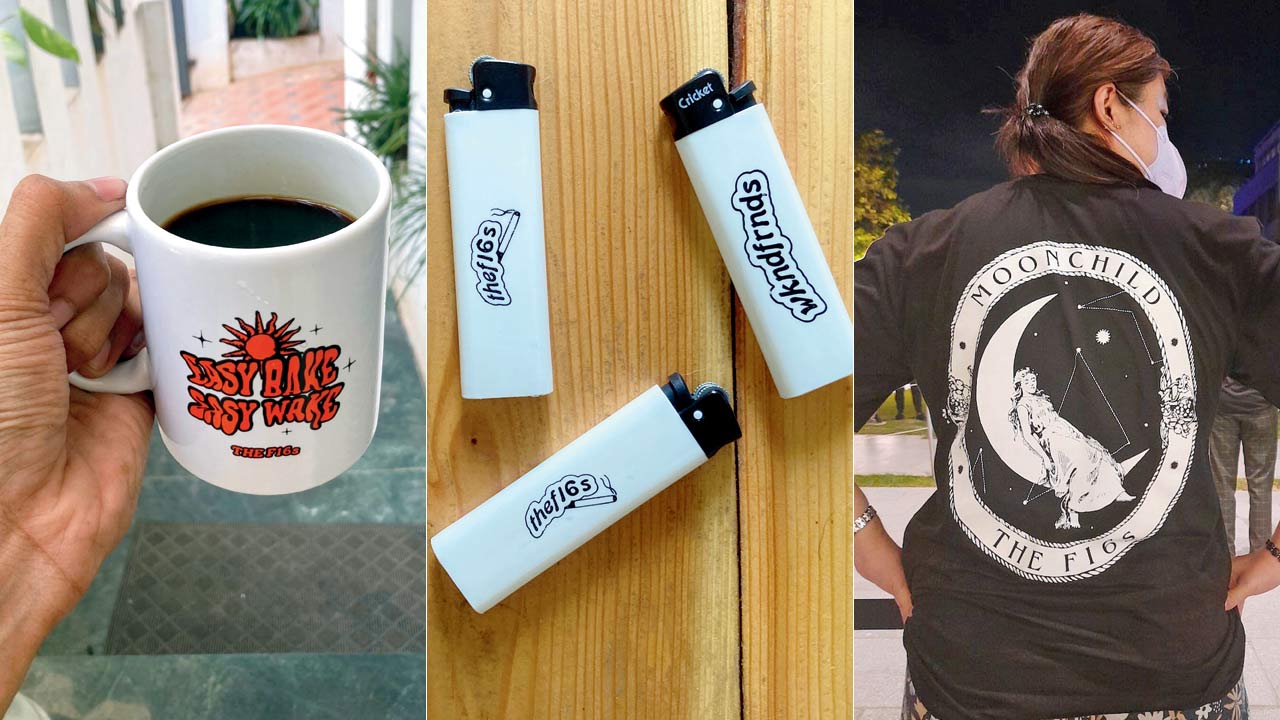Have a favourite Pink Floyd or Metallica t-shirt? Now, Indian indie musicians are also trying to give you a piece of their music in the form of a tote, lighter and lamp

Singer-songwriter Tejas always ensures having high quality artwork. He used his last album Outlast’s artwork on his t-shirt. He will soon diversify his merch collection with more personalised products
Last year, in August, American rapper Travis Scott is said to have set a sales record after he sold merchandise worth $1million after two shows at London’s O2 Arena. These sales are said to surpass the record set by BTS in 2019. For artistes like Scott that charge £125 for a hoodie (R12,292) or Billie Eilish (a hoodie costs £80, which is R7,867), merchandise is just another business model to rake in the moolah.
The same cannot be said for most independent musicians in India. Their select merchandise has more to do with a feeling, and less to add up money. “I have a special section in my cupboard with all of my old merch that I keep because it has sentimental value. It is a way for people who listen to my music, to connect to it,” says Mumbai-based singer-songwriter Tejas, who launched t-shirts for his last album Outlast in 2021.
 Chennai-based alternative band The F16s came up with a limited edition collection of their merch, so that their fans have something unique. Besides mugs, tote bags, hoodies and t-shirts, they also offer lighters. Pic/Atul Kamble
Chennai-based alternative band The F16s came up with a limited edition collection of their merch, so that their fans have something unique. Besides mugs, tote bags, hoodies and t-shirts, they also offer lighters. Pic/Atul Kamble
The idea for having a merch line as a musician hinges on the personal joy that comes from owning something from a band you love . “For me, as a consumer of music,” says Sashank Manohar, graphic designer and bassist of Chennai-based alternative band, The F16s, “I like owning pieces of artistes and bands I like. There is a connection in owning a Radiohead or a Tame Impala t-shirt. That’s why, I can understand my fans and audience wanting to have the same kind of connection.”
For Delhi-based jazz/funk-fusion band, The Revisit Project, dabbling in merchandise was “an experiment”, says Abhay Sharma, composer and saxophone player for the band. They put out t-shirts that had the artwork from their 2019 album Born In Delhi. They sold the first 100 t-shirts, but eventually post pandemic, they gave them out for free because Sharma wanted to have a more organic approach.
 Shweta Srivastava, Abhay Sharma and Sashank Manohar
Shweta Srivastava, Abhay Sharma and Sashank Manohar
A research titled, Merchandise and Memorabilia: Between Art Products, Self-Image, and Musicians Existence, released last year by Khothibul Umam and Gregorius Tri Hendrawan Manurung from the Department of Indonesian Literature, Faculty of Humanities, Diponegoro University, Semarang, Indonesia, says that uniqueness is required for artistic exploration. “Unique merchandise from musicians has a great influence in terms of artistic, sales profits, self-image, and the existence of the musician. As an art commodity, musicians and all their stakeholders are required to be creative and continue to produce products. Even if the product has nothing to do with music.”
Tejas also has a similar thought, “you have to give your fans a chance and an opportunity to love you properly and to show you how much they want to invest in you. You do that by creating things around you and by giving people a chance to buy into the journey you are on”, adding, “The weirder it gets, the more unique, aesthetic and centralised to your personality, the better for your fans.”
The F16s do not conform to the standard, yet unsaid, t-shirt as merch rule. For their 2019 EP, WKND FRNDS, the four-piece band had lighters as part of their merch. The band also has two-week-long limited edition campaigns for any of their new merch, which is usually a follow-up of a new release. “It is difficult for some businesses to give access unless they have a storage facility so it made sense for us to do a campaign where we get orders and then went into production, knowing how much we would spend,” says Manohar. The reason why the limited-edition campaign works for the band is because this helps them come up with different designs, get a clear idea of how many t-shirts to print, gives their fans an opportunity to collect something unique.
Goregaon-based singer-songwriter Shweta Srivastava has a different approach when it comes to her merch. She gives it away as a way to build a community and bond with her superfans. The 29-year-old musician has released three products for her three singles and none of them are t-shirts! One is a tote bag, one is a bunch of stationary and the most recent one is a Saturn-shaped night lamp. “I want it [the products] to be of utility but also not be a push in the face. I like to think out of the box”. The products are linked to the idea of the song and come from a personal space.
 Subscribe today by clicking the link and stay updated with the latest news!" Click here!
Subscribe today by clicking the link and stay updated with the latest news!" Click here!










